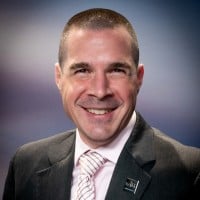Rick Lewis, producer and manager who guided ‘Morning Edition,’ ‘Marketplace’ to air, dies at 71
Rick Lewis, a public radio producer, station manager and fundraiser who worked behind the scenes on launching Morning Edition and Marketplace, died Sept. 9 from a heart attack. He was 71.
Colleagues from NPR and Minnesota Public Radio remembered him as a solid and understated producer, a manager with a sharp intellect and dry sense of humor, and a talented writer with a resonant voice.

“He could tell a joke or say something funny with an absolutely straight face,” said Jim Russell, former Marketplace EP, who worked with Lewis on Marketplace’s startup and at NPR. “He was one hell of a manager, and he was incredibly likable,” Russell added.
A native Iowan, Lewis began his public radio career at WOI in Ames. He departed for NPR eight credit hours short of an undergraduate degree, according to his brother, Tom Lewis. “He never looked back,” Lewis said.
Rick Lewis joined NPR as a newscaster and rose to EP of All Things Considered. He moved into management and became deputy director of news. By 1979, he was involved in what one former colleague described in a Facebook group for former NPR employees as the “painful birthing saga of Morning Edition.”
Morning Edition went through several rounds of piloting ahead of its national launch, Russell said. “Stations detested the results,” he said. “It fell to Rick to fire the hosts and executive producer. It was a bloody Saturday-night massacre deal.”
“It’s anomalous to think about, because Rick was a really sweet guy,” Russell said. “When push came to shove, he did what needed to be done.”
Lewis left NPR to join Minnesota Public Radio, where he was VP of news. He also oversaw business shows offered by MPR’s distribution arm, then known as American Public Radio.
“He was one of the smartest people I’d seen,” said Bill Kling, president emeritus of American Public Media Group, who hired Lewis at MPR. “He had all the right values for covering news. He knew strategy, what we should do and when we should do it.”
By the time APR was looking to improve its business program, then produced by CBS Radio, Lewis had taken a job as manager of KLON in Long Beach, Calif. Kling suggested that he continue working on the show from his new job.
KLON was a “tiny jazz station” owned by Cal State University, Russell said. Lewis founded Pacific Public Radio, an independent nonprofit, to manage it under agreement with the university. PPR was “basically a penniless operation,” Russell said, but became the lead station in developing the show that became Marketplace.
Pacific Public Radio received grants from APR’s Program Fund and CPB to develop Marketplace; KUSC in Los Angeles and WNYC in New York City were also partners in the launch. When CalState officials decided that KLON shouldn’t be involved in national programming, production of Marketplace later transferred to KUSC, Kling said.
Lewis moved back to Iowa to become GM of WOI in Ames. In 1996 he became one of the first employees to sign on at Audible. His official job as director of programming lasted four years, but he left an enduring legacy by recording the “This is Audible” voice tracks that bookend each program.
He later worked in business development, starting with WorldSpace, a now-defunct international satellite radio subscription service; Friends of WLRN, the nonprofit fundraising arm of WLRN in Miami; and at an international nonprofit assisting women and children in Latin America.
At the time of his death, Lewis was living in a village in northern Ecuador, where he had retired in 2012. He shared photos and wrote about his adventures and observations as an expat in the Andes on his blog and operated an export business selling handmade apparel and accessories from Latin America to U.S. consumers.
His marriage to Ann Mosebrook-Lewis ended in divorce. Survivors include his son, Michael, and brother.





